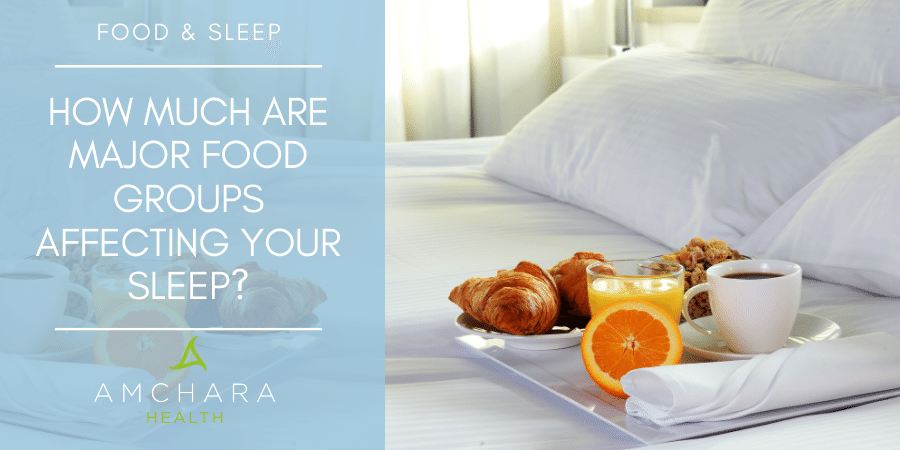Topics covered in this article:
There is an ever-growing awareness of the role of nutrition in determining our level of health. It is now well established that certain eating regimes cause, as well as prevent, a wide range of diseases.
So, if food is medicine, which offers the greatest benefits in terms of improving your sleep?
We always take an evidence-based approach and in this article we take a look at the three most important macronutrients – protein, fat and carbohydrates – and how each of these may be influencing the quantity as well as the quality of your sleep.
Protein, fat and carbohydrates are all vital to human survival in one way or another, not just for energy, growth and repair but also to fight infection and produce neurotransmitters and hormones – regulating all the systems in the body, including your sleep cycle.
Research has identified several neurotransmitters and hormones that play a key role in the sleep-wake cycle. (1)
These include:
- Serotonin
- Gamma-aminobutyric acid (GABA)
- Orexin
- Melatonin
- Cholinergic
- Galanin
- Noradrenaline
- Histamine
The ratio of carbohydrates, proteins and fats in the diet have been investigated as possible sleep inducers – some studies show that dietary modifications may significantly affect sleep.
#1 Sleep stages and the role of neurotransmitters
Sleep architecture is a term used to describe the basic structural organisation of normal sleep.
There are two types of sleep – REM (rapid eye movement) sleep and non-REM, which involves four different stages.
Each stage is linked to brain activity.
All stages of REM and non-REM sleep occur in continuous cycles throughout a typical night’s sleep, with increasingly longer and deeper REM periods towards the morning. (2)
Stage 1 non-REM sleep occurs when you drift into sleep.
This drowsy period consists of light sleep lasting between one and seven minutes.
During this period, your breathing, heartbeat and eye movements slow down and your muscles relax.
Brain wave patterns also begin slowing down.
Stage 2 non-REM sleep is the light sleep that occurs prior to entering deep sleep.
The heartbeat and breathing slow and muscles relax even more.
At this time your body temperature drops, and eye movements stop.
Brain wave activity slows, but still has intermittent bursts of electrical activity.
You spend more of your repeated sleep cycle in this stage 2 cycle than in the other stages of sleep.
This stage of sleep lasts for around 10 to 25 minutes and lengthens with each successive cycle.
Stage 3 non-REM sleep represents moderate to deep sleep, when low-frequency brain waves increase.
It is usually referred to as slow-wave sleep and only lasts a few minutes.
Stage 4 non-REM sleep is the deepest level of sleep – this is what your body needs to feel refreshed and rejuvenated in the morning.
It happens for longer periods during the first half of the night.
Your heartbeat and breathing are at their slowest during this stage.
Muscles are totally relaxed, and brain waves become even slower – this is a time when it may be difficult to be woken up.
Like stage 3 sleep, this stage is also referred to as slow-wave sleep and lasts approximately 20 to 40 minutes.
REM sleep follows a period of slow-wave sleep and typically happens about ninety minutes after drifting off to sleep.
Your eyes move rapidly behind the closed lids from side to side.
Mixed frequency brain wave activity is remarkably similar to that seen in wakefulness and breathing is faster and more irregular.
Heart rate and blood pressure increase to near waking levels.
It is during REM sleep that most of your dreams occur, although some also happen during non-REM sleep.
Your arms and leg muscles become temporarily paralysed, which stops you thrashing around during your dreams.
After around ten minutes of REM sleep, the brain usually cycles back through non-REM sleep stages. On average, four additional periods of REM sleep occur, getting longer each time.
For reasons that are unclear, REM sleep reduces with age; whilst babies experience eight hours of REM sleep, adults aged over 75 only experience about 45 minutes of REM sleep during the night. (5)
-
Chemical signals and the sleep cycle
Clusters of neurons dotted around different parts of the brain become more active as we prepare for sleep.
Key neurotransmitters are able to activate or dampen cells that signal relaxation or arousal.
GABA is associated with sleep, sedation and muscle relaxation, whereas noradrenaline and orexin are responsible for keeping some parts of the brain active during waking hours.
Other neurotransmitters mentioned above, such as histamine and serotonin, help to shape sleep and wakefulness.
For example, serotonin is converted into melatonin, an important hormone that plays a part in regulating our sleep-wake cycles. (12)
Scientists believe that nutritional interventions that may act on these neurotransmitters in the brain could potentially influence sleep.
In order to establish whether manipulating macronutrient intake has any benefits to sleep, researchers need to observe sleep latency (the time it takes to get to sleep), sleep duration, episodes of wakefulness, enhancement of REM sleep and time spent in non-REM sleep.
Sleep data is derived from commonly used methods such as sleep actigraphs (wrist activity monitors), sleep diaries and the Global Pittsburgh Sleep Quality Index.
Here’s what the latest research has to say on each.
#2 Carbohydrates and sleep
A small number of studies have investigated the effects of carbohydrate intake on sleep quality and quantity.
Some of these suggest that high carbohydrate diets have a positive impact on sleep latency. (3)
According to Porter and Horne (4), manipulating carbohydrate intake and altering blood glucose levels in six male subjects led to significantly reduced stage 1 sleep over the entire night, significantly increased REM sleep during the first half of the night and resulted in a significant decrease in stage 4 sleep.
However, sleep onset was not affected.
The authors concluded that raised blood glucose levels were necessary to alter sleep patterns and potentially lead to more restful sleep. (4)
A further study by Afaghi et al. (6), involving healthy men given either high or low glycaemic index (GI) carbohydrate meals, either one hour or four hours before sleep, identified positive sleep benefits for those on the high GI meal, which improved sleep latency.
The authors also found that providing the meal four hours before sleep produced better sleep results than providing the meal just one hour before sleep.
More positive results in favour of carbohydrate diets were also seen in a study by Nehme et al. (7)
The authors studied twenty-four-night security guards over a three week period.
Throughout the study duration workers wore an actigraph device to estimate sleeping and waking times.
The results showed that a complex carbohydrate (low GI) meal produced significantly longer sleep duration and fewer wake up episodes, improving sleep quality of the obese participants compared to other diets.
Overall it would seem that high GI foods (simple carbohydrates) such as white bread, pasta and potatoes may promote sleep, although they should be consumed more than one hour before going to bed.
In addition to this a high carbohydrate eating regime may improve sleep latency and sleep quality.
#3 Protein and sleep
Amino acids are the primary building blocks of protein.
One of these amino acids, tryptophan, has a very important and direct role in the functioning of brain neurotransmitters.
Tryptophan is a necessary cofactor in the production of the neurotransmitter serotonin, which is then converted to melatonin – therefore it plays a key role in promoting sleep.
According to research, a lack of tryptophan can reduce the availability of serotonin, which may lead to sleep disturbances. (3)
It stands to reason that protein sources of tryptophan could therefore promote sleep quality or quantity.
However, early studies suggest that high protein diets are not significantly associated with sleep onset latency. (8)(9)
By contrast, a later study found that sleep quality did improve in a group of overweight participants who consumed a high protein diet. (10)
Aoyama A et al. (11) reported conflicting results.
The authors found that a high protein diet was associated with difficulty maintaining sleep, whereas a low protein diet increased sleep onset latency and resulted in poor quality of sleep.
A more recent study placed elite athletes on a high protein diet and found that their sleep duration was lower than the recommended seven to nine hours of sleep, although there was no difference in sleep quality or duration between the high protein diet participants and those on the low protein diet.
It seems more research is needed before it can be determined conclusively what effect protein has on sleep.
#4 Dietary fats and sleep
Research results on the relationship between dietary fat consumption and its effects on sleep have been inconsistent.
Some studies, such as research by Gierow et al. (13), show sleep quality improved on a high fat diet.
The authors found that a diet high in omega-3 essential fatty acids reduced sleep disturbances in depressed patients.
This outcome suggests that linoleic and eicosadienoic acid could be helpful for maintaining sleep due to their function as precursors of the sleep-inducing fatty acid oleamide.
Data retrieved from the 2007-2008 National Health and Nutrition Examination Survey provided additional insights into the association between fat and sleep quality.
The results determined that a low fat diet was linked to excessive daytime drowsiness and non-restorative sleep. (14)
However, results collected from participants trialling the difference between controlled and no limitation diets indicated that higher saturated fat intakes may produce less slow-wave sleep, more night-time arousals, and a reduction in overall sleep quality. (15)
Take home message
Although there are some conflicting results in the studies discussed above, with more research there is the potential for specific food groups to be utilised as therapeutic interventions in the treatment of insomnia.
If you are struggling with sleep disturbances it may be worth experimenting with different eating regimes to see whether increasing or decreasing a particular food group has any impact on your sleep quality.
Have you found your nutritional choices impact your sleep quality?
We believe that sharing knowledge and experience is an important part of achieving optimal health and would love to hear your thoughts.
Talking to one of Amchara’s Personalised Health practitioners could help you find the reasons why you are experiencing poor quality sleep.
Contact us for a complimentary consultation.
READ THIS NEXT:




